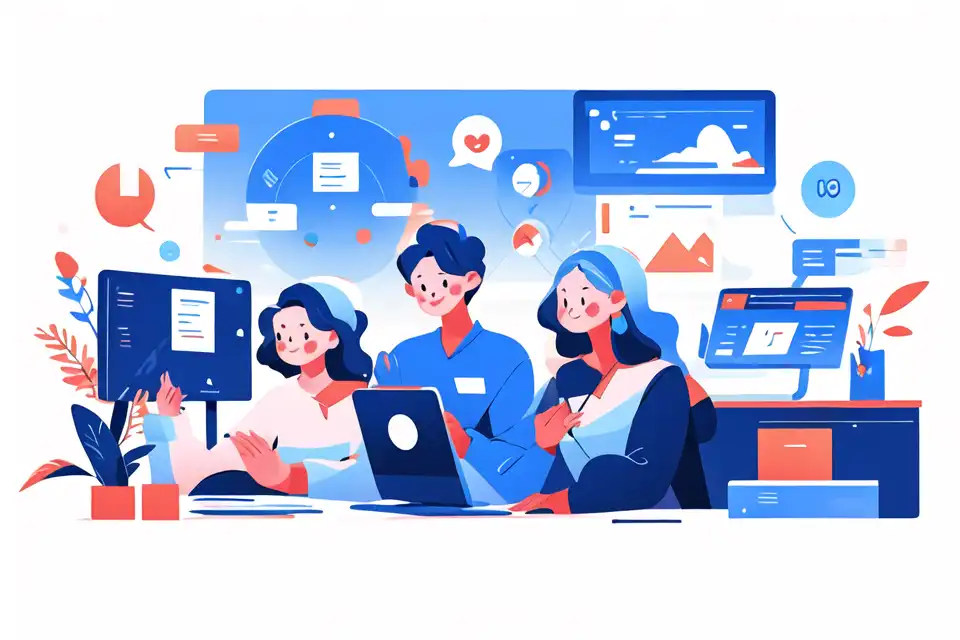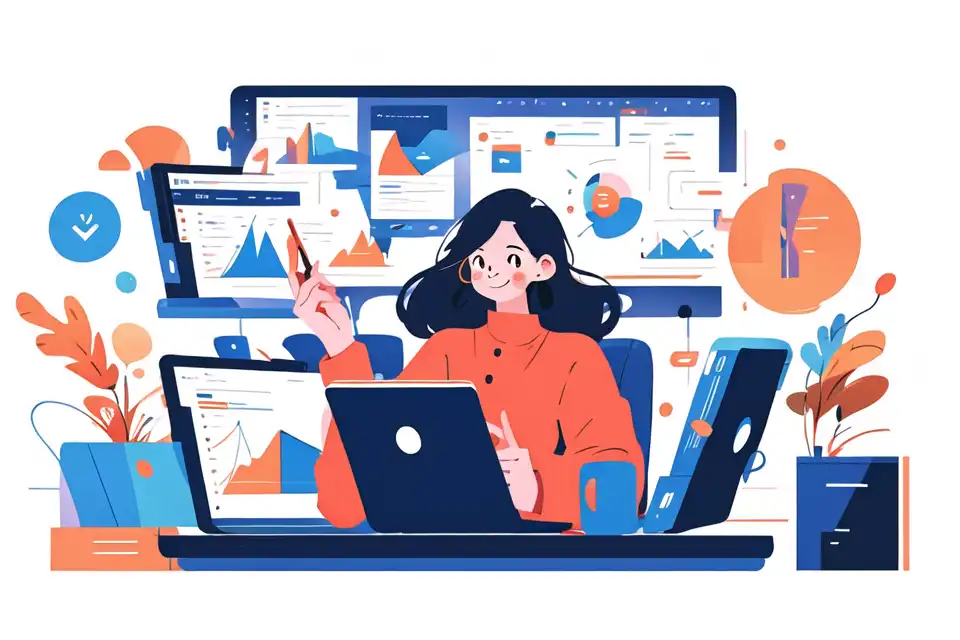Generative AI Trends
Learn about the top tips and strategies in generative AI trends.
Try Lark for Free
In the whirlwind of digital revolution, businesses are constantly seeking innovative ways to stay competitive and relevant. One of the most promising avenues in this pursuit is the rise of generative AI trends. Generative AI is the power behind creating something new, such as creating human-like text, generating 3D models of objects, or even composing music. This technology, once harnessed, can lead to unprecedented levels of efficiency and innovation. In this article, we will explore the transformative potential of generative AI trends, how they are shaping digital strategies, and their growing significance in the corporate ecosystem.
"Unlock the power of Lark to elevate your business operations."
Understanding generative ai trends in the business landscape
Generative AI, or artificial intelligence that creates, is a broad term that encompasses a variety of algorithms and models, such as Generative Adversarial Networks (GANs) and Variational Autoencoders. These concepts might sound daunting, but their end goal is straightforward: to generate new data that mimics the original training data. These powerful tools can lead to tremendous strides in industries ranging from healthcare to entertainment, and even business operations.
According to a recent Gartner report, by 2023, generative AI will be a critical component in more than 30% of digital content. This is a testament to the growing importance of this technology in diverse fields. Businesses that adapt and integrate these trends into their operations stand to gain a competitive edge in their respective industries.
Role and impact of generative ai trends in the workplace
Generative AI is not just a concept of the future; it's already making its presence felt in the workplace. Take, for example, Lark, an all-in-one collaboration suite. Lark uses AI to streamline workflows and improve productivity. It can automatically schedule meetings based on participant availability, translate messages in real-time, and even generate meeting minutes, freeing up valuable time and resources.
Similarly, generative AI can enhance creativity and innovation in the workplace. For instance, design teams can use GANs to generate a variety of design proposals, which can then be fine-tuned to meet specific needs. This process can significantly reduce the time spent on conceptualization and ideation, allowing more time for execution and refinement.
Learn more about Lark can help you with everything mentioned in the article.
Strategies to implement generative ai trends
Adopting generative AI trends requires a careful and strategic approach. Businesses must first identify areas where generative AI can have the most significant impact. This could be automating repetitive tasks, enhancing creativity, or improving decision-making processes.
Next, businesses should invest in employee education and training. Understanding and using generative AI effectively requires a certain level of technical knowledge. Providing employees with the necessary training and resources can facilitate the successful implementation of these trends.
Technological considerations for generative ai trends
When it comes to integrating generative AI trends, choosing the right technology is crucial. There are numerous generative AI tools and platforms available, each with its unique capabilities and features. Lark, for instance, offers a robust suite of AI-driven tools designed to improve productivity and collaboration in the workplace.
It's also essential to consider how generative AI trends can be integrated with existing systems and workflows. The goal is to enhance, not disrupt, current operations. For instance, Lark seamlessly integrates with a multitude of third-party applications, ensuring a smooth transition and minimal disruption to existing workflows.
Learn more about Lark can help you with everything mentioned in the article.
Case studies: successful implementation of generative ai trends
The potential of generative AI trends is not just theoretical; numerous organizations have successfully adopted and leveraged these trends. For example, a multinational corporation used a generative AI model to automate the creation of marketing content, resulting in a 60% reduction in content production time and a 30% increase in engagement rates.
Another case study involves a healthcare organization that used generative AI to develop personalized treatment plans. The AI model analyzed patient data to predict the most effective treatment options, leading to improved patient outcomes and increased efficiency.
Challenges and solutions in adopting generative ai trends
While generative AI trends offer numerous benefits, they also present several challenges. Data privacy is a significant concern, as generative AI models require access to large amounts of data. Job displacement is another potential issue, as automation could potentially replace certain job roles.
However, these challenges are not insurmountable. Robust data protection measures can ensure privacy and compliance. Furthermore, while AI can automate certain tasks, it also creates new roles and opportunities. Embracing a future with AI requires a balanced approach, prioritizing both technological advancement and human value.
Learn more about Lark can help you with everything mentioned in the article.
Future trends: embracing the evolution of generative ai
Generative AI trends are evolving rapidly, with new applications and possibilities emerging continuously. From AI-generated art and music to personalized marketing campaigns and innovative healthcare solutions, the potential applications of generative AI are vast and varied.
Preparing for these future developments requires proactive learning and adaptation. By staying abreast of the latest trends and developments, businesses can future-proof themselves and remain at the forefront of their industries.
Conclusion
Generative AI trends have the potential to revolutionize the way we work. They offer unprecedented levels of efficiency, creativity, and innovation. However, harnessing their potential requires a strategic and responsible approach, prioritizing both technological advancement and human value. The future of work is here, and it's powered by generative AI.
Learn more about Lark can help you with everything mentioned in the article.
Faqs on generative ai trends
What is generative AI? Generative AI refers to artificial intelligence models that can generate new data that mimics the original training data. Examples include creating human-like text, generating 3D models of objects, or composing music.
How does generative AI affect the workplace? Generative AI can enhance productivity through automation and foster creativity and innovation. It can also streamline decision-making processes, leading to improved business outcomes.
What are the challenges in adopting generative AI trends? Some challenges include data privacy concerns, job displacement, and the technical knowledge required to implement and use generative AI effectively.
How can businesses overcome these challenges? Businesses can overcome these challenges by implementing robust data protection measures, providing employee education and training, and adopting a balanced approach that prioritizes both technological advancement and human value.
What is the future of generative AI? The future of generative AI is promising, with new applications and possibilities emerging continuously. It is expected to play a crucial role in various industries, from healthcare to entertainment, and even business operations.
Do's and don’ts in implementing generative ai trends
| Do's | Don’ts |
|---|---|
| Identify areas where generative AI can have the most impact | Don’t implement generative AI without a clear strategy |
| Invest in employee education and training | Don’t overlook the importance of technical knowledge |
| Choose the right technology for your needs | Don’t rush into adopting generative AI without understanding its capabilities |
| Integrate generative AI with existing systems and workflows | Don’t disrupt current operations |
| Stay abreast of the latest generative AI trends | Don’t ignore the evolution of generative AI |
Learn more about Lark can help you with everything mentioned in the article.
Step-by-step guide: adopting generative ai trends in your organization
- Identify potential areas of impact: Determine where generative AI can enhance productivity, creativity, or decision-making processes in your organization.
- Invest in employee training: Provide employees with the necessary training and resources to understand and use generative AI effectively.
- Choose the right technology: Evaluate various generative AI tools and platforms to find one that best suits your needs and capabilities.
- Integrate with existing systems: Ensure that the adoption of generative AI enhances, not disrupts, your current operations.
- Stay updated: Regularly monitor the latest developments and trends in generative AI to stay at the forefront of this technology.
"Unlock the power of Lark to elevate your business operations."








